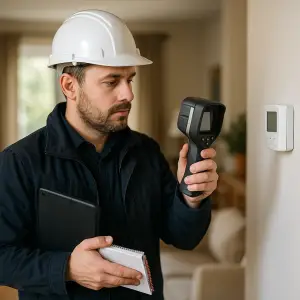Understanding Indoor Allergens
Before diving into the benefits of home ventilation, it’s essential to understand the indoor allergens that can wreak havoc on your health. Common indoor allergens include:
- Dust Mites: These microscopic creatures thrive in mattresses, pillows, and upholstery.
- Pet Dander: If you have furry friends, their skin flakes can become airborne allergens.
- Mould Spores: Mould can grow in damp areas of your home, releasing spores that trigger allergies.
- Pollen: Pollen can find its way indoors, especially during the spring and summer months.
- Indoor Smoke: Smoke from cooking or tobacco can irritate allergies.
The Role of Home Ventilation
Now, let’s explore how a well-designed home ventilation system can help allergy sufferers breathe easier:
Removal of Allergen-Loaded Air
One of the primary benefits of home ventilation is its ability to remove indoor air pollutants and allergens. Through proper filtration and circulation, ventilation systems can significantly reduce the concentration of dust mites, pet dander, and other allergens in the air. This means fewer irritants to trigger your allergies.
Regulated Humidity Levels
Excessive humidity can create the perfect breeding ground for mould and dust mites. Home ventilation systems often come with humidity control features, helping maintain optimal indoor humidity levels. By keeping humidity in check, these systems prevent mould growth and the proliferation of dust mites, relieving allergy sufferers.
Continuous Fresh Air Supply
Proper ventilation ensures a continuous supply of fresh outdoor air, diluting the concentration of indoor pollutants. This constant flow of fresh air can help remove allergens and improve indoor air quality, creating a healthier environment for those with allergies.

Filtering Out Pollen
During the allergy season, pollen can make its way into your home through open windows and doors. Ventilation systems equipped with effective filters can capture pollen particles, preventing them from circulating indoors. This simple but crucial step can significantly reduce allergy symptoms.
Choosing the Right Ventilation System
Now that you understand how home ventilation can benefit allergy sufferers, it’s important to choose the right system for your needs. Here are some tips:
1. Consult a Professional
Seek advice from a qualified HVAC professional who can assess your home’s specific needs. They can recommend the most suitable ventilation system based on factors like the size of your home and your allergy triggers.
2. Consider HEPA Filters
High-efficiency particulate Air (HEPA) filters are known for their effectiveness in capturing allergens. Choosing a ventilation system with HEPA filtration can significantly improve indoor air quality for allergy sufferers.
3. Maintenance Matters
Regular maintenance is essential to ensure your ventilation system continues to work optimally. Replace filters as recommended and schedule routine check-ups to keep allergens at bay.

Home Ventilation: Key to a Comfortable and Healthy Living Space
In the battle against allergies, every advantage counts. Home ventilation systems offer a powerful tool to help allergy sufferers breathe easy and enjoy a more comfortable life. By removing allergen-loaded air, regulating humidity, providing a continuous supply of fresh air, and filtering out pollen, these systems can make a significant difference in your indoor air quality.
Talk to the team at Ratio Seven, choose the right system, and prioritise maintenance to reap the full benefits of home ventilation for allergy relief.




